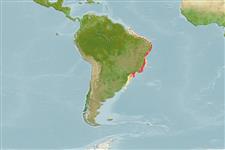>
Gobiiformes (Gobies) >
Microdesmidae (Wormfishes) > Ptereleotrinae
Etymology: Ptereleotris: Greek, pteron = wing, fin + The name of a Nile fish, eleotris (Ref. 45335); randalli: Named for John E. Randall..
Environment: milieu / climate zone / depth range / distribution range
Ecologia
marinhas associadas(os) a recifes; intervalo de profundidade 8 - 70 m (Ref. 84213). Tropical
Southwest Atlantic: endemic to Brazil.
Tamanho / Peso / Idade
Maturity: Lm ? range ? - ? cm
Max length : 8.7 cm SL macho/indeterminado; (Ref. 84213); 4.9 cm SL (female)
Descrição suscinta
Chaves de identificação | Morfologia | Morfometria
Espinhos dorsais (total) : 7; Raios dorsais (total) : 22 - 24; Espinhos anais: 1; Raios anais : 21 - 23. This species is distinguished from its Atlantic congeners by having the following characters: dorsal and anal fins with bright orange-yellow submarginal bands; second dorsal and anal fins comparatively low, slightly elevated anteriorly; short caudal fin, 5ht and 6th rays prolonged as filaments; short pelvic fins, about the same length as pectorals (Ref. 84213).
Used in the aquarium trade under the name Opistognathus leitoso. The population is declining fast in some areas of the Brazilian coast (mainly off the States of Espirito Santo and Bahia) due to commercial exploration of the calcareous algae banks. This species hovers over its burrow feeding on plankton and dives headfirst in to the burrow when threatened. Found usually over sandy bottom close to reefs, but also common over sand patches as small as 10 cm in diameter, enclosed by rocky areas or in calcareous algae (Lithothamnion sp.) banks (Ref. 84213). Maximum depth from Ref. 126840.
Ciclo de vida ou comportamento de acasalamento
Maturities | Reprodução | Spawnings | Egg(s) | Fecundities | Larvas
Gasparini, J.L., L.A. Rocha and S.R. Floeter, 2001. Ptereleotris randalli n. sp., a new dartfish (Gobioidei: Microdesmidae) from the Brazilian coast. aqua, J. Ichthyol. Aquat. Biol. 4(3):109-114. (Ref. 84213)
Status na Lista Vermelha da UICN (Ref. 130435)
Ameaça para os humanos
Harmless
Uso pelos humanos
Pescarias: espécies comerciais; Aquário: Espécies comerciais
Ferramentas
Relatórios especiais
Baixar XML
Fontes da internet
Estimates based on models
Preferred temperature (Ref.
123201): 24.6 - 27.6, mean 27.2 °C (based on 58 cells).
Índice de diversidade filogenética (Ref.
82804): PD
50 = 0.5000 [Uniqueness, from 0.5 = low to 2.0 = high].
Bayesian length-weight: a=0.00389 (0.00180 - 0.00842), b=3.12 (2.94 - 3.30), in cm total length, based on all LWR estimates for this body shape (Ref.
93245).
Nível Trófico (Ref.
69278): 3.3 ±0.4 se; based on size and trophs of closest relatives
Fishing Vulnerability (Ref.
59153): Low vulnerability (10 of 100).
